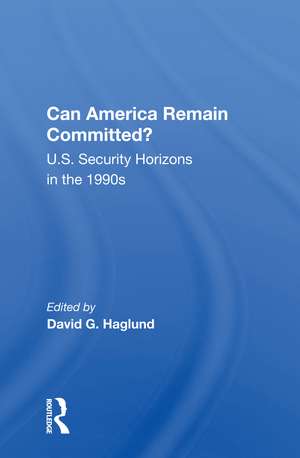Can America Remain Committed?: U.s. Security Horizons In The 1990s
Editat de David G. Haglunden Limba Engleză Paperback – 31 mai 2021
| Toate formatele și edițiile | Preț | Express |
|---|---|---|
| Paperback (1) | 262.65 lei 6-8 săpt. | |
| Taylor & Francis – 31 mai 2021 | 262.65 lei 6-8 săpt. | |
| Hardback (1) | 765.84 lei 6-8 săpt. | |
| Taylor & Francis – 13 sep 2019 | 765.84 lei 6-8 săpt. |
Preț: 262.65 lei
Preț vechi: 312.81 lei
-16% Nou
Puncte Express: 394
Preț estimativ în valută:
50.26€ • 53.74$ • 41.90£
50.26€ • 53.74$ • 41.90£
Carte tipărită la comandă
Livrare economică 17 aprilie-01 mai
Preluare comenzi: 021 569.72.76
Specificații
ISBN-13: 9780367157333
ISBN-10: 0367157330
Pagini: 318
Dimensiuni: 152 x 223 mm
Greutate: 0.59 kg
Ediția:1
Editura: Taylor & Francis
Colecția Routledge
Locul publicării:Oxford, United Kingdom
ISBN-10: 0367157330
Pagini: 318
Dimensiuni: 152 x 223 mm
Greutate: 0.59 kg
Ediția:1
Editura: Taylor & Francis
Colecția Routledge
Locul publicării:Oxford, United Kingdom
Cuprins
Introduction: America in a Unipolar World? Part One: Commitments 1. United States Security Policy in the 1990s: Decade of Grace, Decade of Decision 2. Questioning the Unquestionable: American Perspectives on European "Security Architecture" 3. The United States and the United Germany: Partners in Leadership? 4. Will Japan Remain Committed? The Changing Dynamics of the US–Japanese Security Relationship 5. Korea: Mission Complete? Part Two: Capabilities 6. After the "Maritime Strategy": The United States Navy in the Post–Cold War Era 7. The Influence of Nuclear Weapons on Future American Foreign Policy 8. Security Assistance: An Applicable Strategy for the 1990s? 9. Security, Competitiveness, and International Cooperation in US Defense Industrial Base Policy Part Three: Conclusion 10. Can America Remain Committed?
Descriere
This book is concerned with the myriad of foreign security commitments and the means available to America to fulfill them. It represents the scholarly results of the collective project (on US security horizons) mounted by the Queen's University Centre for International Relations.
